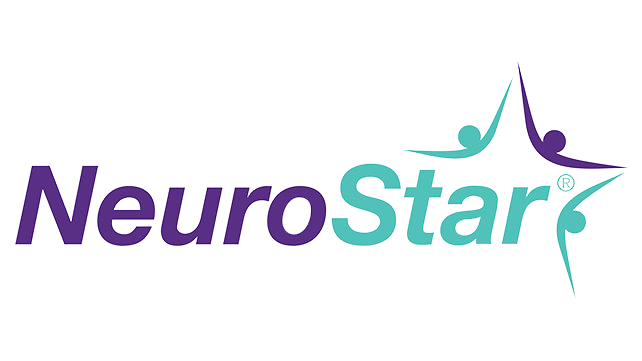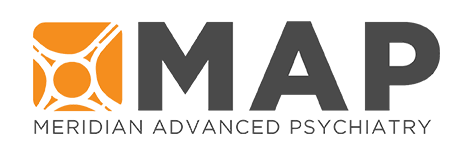TMS For Depression
TMS Therapy is only available at our Meridian North location on Summit Way.
Meridian Advanced Psychiatry (MAP) provides TMS Therapy to help overcome depression
Our providers offer personalized care throughout the treatment process to help you beat depression and enjoy life more.
TMS Therapy is short for Transcranial Magnetic Stimulation. TMS Therapy is highly effective, safe, and FDA approved. It provides real, long-term results for people who haven't found relief from depression through anti-depressants.
Depression is a debilitating mental health condition that can significantly impact an individual's daily life and well-being. Despite the availability of traditional treatments such as antidepressant medications and psychotherapy, many people continue to struggle with persistent symptoms of depression.
DID YOU KNOW?
Over 40 - 60% of people who take antidepressants medications don't get relief from their depression symp
Transcranial Magnetic Stimulation (TMS)
is an alternative depression solution for people who haven't responded well to traditional antidepressant medications. TMS is a non-invasive procedure that involves using magnetic fields to stimulate specific areas of the brain associated with mood regulation. TMS Therapy has been proven to be effective for treatment-resistant depression! It's a viable option for those who do not experience relief from or cannot tolerate antidepressants.

About NeuroStar TMS
NeuroStar uses transcranial magnetic stimulation (TMS) to target key areas of the brain that are underactive in people with depression. It is not ECT (electroconvulsive therapy).
What is NeuroStar Advanced Therapy (TMS)?
NeuroStar uses focused magnetic pulses (similar in strength to an MRI), to revitalize underactive areas of the brain involved in regulating mood. When these regions are underactive, depression can result. "Waking up" in these regions can have lasting effect on depression making long-term remission from depression a reality for many people.
Treatment with NeuroStar Advanced Therapy is easy:
- Therapy sessions are conducted in your NeuroStar doctor's office
- You can return to normal activities right away
- You are awake during treatment
- There are no negative effects on memory or sleep
- It's covered by most health insurance plans, including Medicare and Tricare
What To Expect
Here's what you can expect from a NeuroStar Advanced Therapy (TMS) session:
Before Treatment
You'll recline comfortable in the treatment chari. A curved magnetic coil will be positioned on your head.
During Treatment
You'll hear a clicking sound and feel a tapping sensation on your head as the NeuroStar coil focuses treatment precisely at the source of the depression: the brain. The patented Contact Sensing technology ensures the prescribed dose is delivered, every treatment, every pulse.
After Treatment
With NeuroStar TMS you are fully awake and alert during treatment and may drive home and resume daily activities immediately afterwards. Depending on your doctor's recommendation, a typical NeuroStar treatment plan includes 36 sessions that each last between 19-37 minutes. Completing the full NeuroStar treatment course gives the best chance for delivering long-lasting relief from depression.
FAQs
Q: What is NeuroStar Transcranial Magnetic Stimulation (TMS)?
NeuroStar TMS is a non-drug, noninvasive treatment that uses focused magnetic fields to revitalize underactive areas of the brain to improve symptoms of depression. NeuroStar is a safe, effective depression treatment for people who have not found relief from antidepressants.
Q: How does NeuroStar TMS work?
NeuroStar uses focused magnetic pulses (similar in strength to an MRI), to revitalize underactive areas of the brain involved in regulating mood. When these regions are underactive, depression can result. "Waking up" these regions can have a lasting effect on depression, making long-term remission from depression a reality for many people.
Q: How long is NeuroStar TMS treatment?
A typical NeuroStar treatment plan includes 36 sessions that each last between 19-37 minutes. Your doctor will determine what is right for you. Completing the full NeuroStar treatment course gives the best chance for delivering long-lasting relief from depression.
Q: Is NeuroStar TMS Therapy covered by my insurance?
NeuroStar is covered by most major insurance plans, including Medicare and Tricare. Over 300 million people have insurance plans that cover NeuroStar.
Q: Is NeuroStar TMS Therapy a good alternative for patients who cannot tolerate the side effects of antidepressant medications?
NeuroStar is a safe and effective treatment without the systemic side effects of medication. The most common side effect is mild to moderate pain or discomfort at the treatment site. For most patients this subsides within the first week of treatment.
Q: Is NeuroStar TMS Therapy like other alternative therapies that use magnets to treat some illnesses?
No. TMS Therapy involves a unique method of using pulsed magnetic fields for a therapeutic benefit. The intensity of the magnetic field is similar to that of an MRI. These techniques differ radically from the popular use of low intensity, static magnetic fields. Those products deliver weak and undirected static fields that are not capable of activating brain cells. The activation and simulation of brain cells is a key part of why TMS is so effective.
Indication Statement
The NeuroStar Advanced Therapy System is indicated for the treatment of depressive episodes and for decreasing anxiety symptoms for those who may exhibit comorbid anxiety symptoms in adult patients suffering from Major Depressive Disorder (MDD) and who failed to achieve satisfactory improvement from previous antidepressant medication treatment in the current episode.
The NeuroStar Advanced Therapy system is intended to be used as an adjunct for the treatment of adult patients suffering from Obsessive-Compulsive Disorder (OCD).
NeuroStar Advanced Therapy is only available by prescription. A doctor can help decide if NeuroStar Advanced Therapy is right for you. Patients' results may var.
The most common side effect is pain or discomfort at or near the treatment site. These events are transient; they occur during the TMS treatment course and do not office for most patients after the first week of treatment. There is a rare risk of seizure associated with the use of TMS therapy (<0.1% per patient).
Visit neurostar.com for full safety and prescribing information.
Key Messaging
Does it work?
For people who have not found relief with antidepressants, NeuroStar is a sfae and proven depression treatment without the systemic side effects of medication. Over 4.8 million NeuroStar Advanced TMS treatments have been performed in over 134,000 patients.
Does it hurt?
Many patients experience side effects from their medication, increasing the chance that they will stop taking them. The most common side effect with NeuroStar is mild to moderate pain or discomfort at the treatment site. For most patients with subsides within the first week of treatment.
Is it covered?
Most major insurances cover NeuroStar TMS, including Medicare plans nationwide.
Clinical & Academic References
Carpenter LL, et al. (2012). Transcranial Magnetic Stimulation (TMS) for Major Depression: A Multisite, Naturalistic, Observational Study of Acute Treatment Outcomes in Clinical Practice. Depression and Anxiety, 29(7):587-596. www.ncbi.nlm.nih.gov/pubmed/22689344
George MS, et al. (2010). Daily Left Prefrontal Transcranial Magnetic Stimulation Therapy for Major Depressive Disorder: A Sham-Controlled Randomized Trial. Arch Gen Psychiatry, 67(5):507-516. www.ncbi.nlm.nih.gov/pubmed/20439832
Dunner DL, et al. (2014). A Multisite, Naturalistic, Observational Study of Transcranial Magnetic Stimulation (TMS) for Patients with Pharmacoreistant Major Depressive Disorder: Durability of Benefit Over a 1-Year Follow-Up period. J Clin Psychiatry. 75(12):1394-1401.
www.ncbi.nlm.gov/pubmed/25271871
O'Reardon JP, et al. (2007). Efficacy ad Safety of Transcranial Magnetic Stimulation in the Acute Treatment of Major Depression: A Multisite Randomized Controlled Trial. Biol Psychiatry, 62(11):1208-1216. www.ncbi.nlm.nih.gov/pubmed/17573044
IS TMS SAFE?
TMS Therapy is FDA-cleared and is a safe treatment for depression. Since TMS Therapy is a medication-free treatment for depression, patients can avoid the common side effects that can come from antidepressant medications.
IS TMS EFFECTIVE?
In a clinical study, 83% of patients experienced meaningful reduction in depression symptoms. Depression symptoms effectively go away for 62% of TMS patients! TMS brings lasting depression relief without the aid of antidepressants.
HOW DOES TMS WORK?
A cushioned coil is precisely placed on the head. It emits magnetic pulses to activate precise regions of the brain and strengthen neuroconnections. This increases the release of neurotransmitters to activate the areas of the brain that affect mood. The pattern of repeated stimulation promotes neuroplasticity, which is the brain's ability to adapt and change. This contributes to the long-lasting relief from depression!
HOW FAST DOES TMS ELIMINATE DEPRESSION?
The full TMS treatment course is seven weeks long. It includes a total of 36 TMS sessions that take place once per day, five days per week. Each session is about 19 minutes long. Patients are about to immediately return to their regular activities after treatment. Many patients report experiencing relief from depression early in the treatment course, but the entire 7 week course should be completed to help bring long-lasting result
Self-Assessment Form
We will get back to you as soon as possible.
Please try again later.
Contact Us
We will get back to you as soon as possible.
Please try again later.

